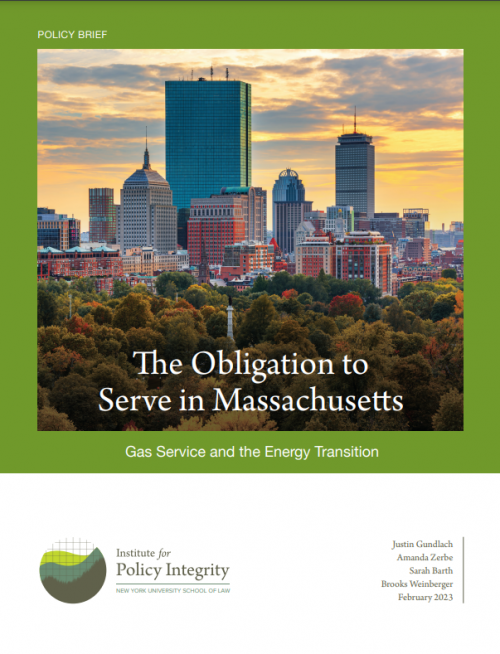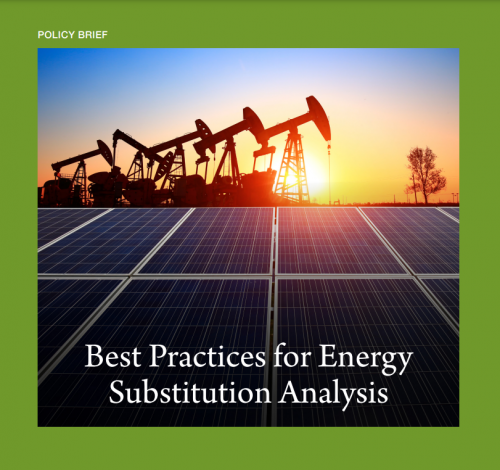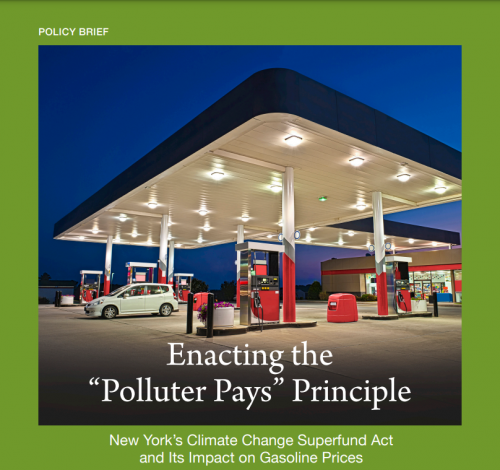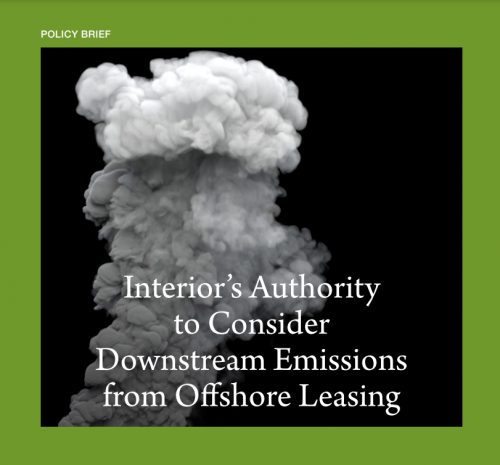-
Comments to EPA on Louisiana Primacy for Carbon Sequestration Wells
We recently filed comments to EPA on its proposal to grant the State of Louisiana primary enforcement responsibility (primacy) over Class VI injection wells used for geologic carbon sequestration. Our comments encourage EPA to ensure that Louisiana has adequate and timely plans for transitioning Class II enhanced oil or gas recovery wells to the Class VI program, where appropriate, in order to mitigate safety concerns. Louisiana’s planned timeline for Class II transition fails to meet some of the requirements set forth in EPA’s regulations and guidance, and the state’s Class II transition plan and related regulations may be inadequate for mitigating risks. Our comments also encourage EPA to provide thorough responses to all concerns raised by community members about risk and oversight of injection wells, and require appropriate risk-mitigation measures before granting primacy.
-

The Obligation to Serve in Massachusetts
Gas Service and the Energy Transition
In Massachusetts, achieving the state’s decarbonization target in a cost-effective manner will likely require the refusal of new gas service in addition to the termination of existing gas service in certain buildings and its replacement with electric service. The scope of utilities’ legal obligation to serve their customers will be central to those efforts. This brief analyzes the contours of this obligation by examining the relevant Massachusetts statutes, regulations, Public Utility Commission decisions, and case law.
-
Policy Integrity Amicus Brief Cited Extensively in BLM Drilling Case
We filed an amicus brief in a case challenging the Bureau of Land Management's approval of over 300 oil and gas drilling permits in New Mexico. Our brief highlighted problems in the agency's analysis, which inappropriately minimized the climate impacts of new drilling through comparison to nationwide totals. We explained that the agency’s approach did not facilitate a rational analysis of the project's climate effects and failed to meet the National Environmental Policy Act’s requirement that agencies analyze the actual environmental impacts of their actions. In its decision ruling against the agency, the U.S. Court of Appeals for the Tenth Circuit cited our brief extensively and adopted many of our arguments against BLM’s comparison-based approach to assessing the significance of climate impacts.
-

Best Practices for Energy Substitution Analysis
In recent years, numerous federal agencies have made a controversial claim: that projects locking in fossil fuels over the long term will decrease aggregate greenhouse gas emissions, or that their effects on total emissions will be limited. In many of those cases, however, agencies have reached this counter-intuitive conclusion using a flawed consideration of energy substitution. This report identifies some of the recurring problems with agency analysis of energy substitution and offers best practices to apply moving forward.
-
Amicus Brief in D.C. Circuit Defending BOEM’s Authority to Robustly Consider Climate Impacts in Offshore Leasing
Earlier this year, a group of environmental organizations successfully challenged an offshore oil-and-gas lease sale held by the Bureau Ocean Energy Management on the basis that BOEM inadequately assessed the impacts on climate change from the combustion of the fossil fuels that the lease sale would facilitate. In its appeal to the D.C. Circuit, the American Petroleum Institute countered that any analytical limitations were harmless because the Outer Continental Shelf Lands Act bars BOEM from considering climate-change impacts when administering leasing policy. Our amicus brief rebuts this argument and defends BOEM’s authority to consider downstream climate impacts in its administration of the offshore leasing program. Our brief explains that the consideration of downstream emissions is consistent with OCSLA’s text, legislative history, regulatory history, and caselaw.
-

Enacting the “Polluter Pays” Principle
New York’s Climate Change Superfund Act and Its Impact on Gasoline Prices
This policy brief analyzes how New York State’s recently proposed Climate Change Superfund Act is most likely to affect consumer gasoline prices. The Act would require payments from fossil-fuel companies based on their historical contributions to current greenhouse gas levels in the atmosphere. The payments would be used to build green infrastructure to help the state adapt to climate change. The brief finds that the Act would likely have a negligible impact on current and near-term oil prices, while potentially lowering future energy prices in New York, including for transportation.
-
Comments on BSEE Well Control Rule
Policy Integrity submitted comments to the Bureau of Safety and Environmental Enforcement (BSEE), located within the Department of the Interior, in support of its proposed rule to strengthen regulations for well control and blowout preventer systems in the Outer Continental Shelf. This rule aims to reduce the risk of loss-of-well-control events, such as the Deepwater Horizon oil spill, by tightening well operator reporting requirements and equipment standards. Our comments encourage BSEE to strengthen the Proposed Rule's cost-benefit analysis by performing a break-even analysis and quantitatively assessing and/or qualitatively describing the full range of harms that result from well blowouts.
-
Comments on Natural Capital Accounting
In August, the White House Office of Management and Budget published a request for information to help inform the development of government-wide natural capital accounts and standardized environmental-economic statistics. We joined a comment letter with five other organizations supporting this strategy of valuing the nation's capital stocks. The letter explained that management of the nation’s natural capital stocks is vital for our economy, and that comprehensive, consistent, and comparable information on natural capital stocks and flows will improve policy and decision-making. The letter also highlighted the strong theoretical and empirical foundations for valuing natural capital stocks.
-
Supplemental Comments Addressing Impact of West Virginia v. EPA on FERC’s Proposed Policy Statements for Natural Gas Infrastructure
In February, the Federal Energy Regulatory Commission proposed two policy statements that called for the consideration of climate impacts in pipeline certificate proceedings. In April, we filed two comments letters on these proposed policy statements, including one letter filed jointly with over two dozen legal scholars rebutting arguments that the Commission lacks authority to consider climate effects in its oversight of natural gas infrastructure under the Natural Gas Act and, relatedly, that the proposed policy statements implicate the major questions doctrine. Today, we submitted supplemental comments rebutting arguments that the Supreme Court’s recent decision on the major questions doctrine in West Virginia v. EPA somehow affects the Commission’s ability to finalize its proposed policy statements.
-

Interior’s Authority to Consider Downstream Emissions from Offshore Leasing
In its proposed Outer Continental Shelf oil and gas leasing program for 2023–2028, the Bureau of Ocean Energy Management (BOEM) claims that it cannot consider downstream greenhouse gas emissions when setting leasing policy because of a 2009 D.C. Circuit case, Center for Biological Diversity v. Department of the Interior (CBD). This Policy Brief explains that BOEM misreads CBD, which held only that the Outer Continental Shelf Lands Act (OCSLA) does not require the agency to consider downstream effects. The Policy Brief further explains that neither CBD nor any other case law bars BOEM from considering downstream effects and that consideration of such effects is in fact consistent with the text, legislative history, and regulatory history of OCSLA.
Viewing recent projects in Natural Resources




